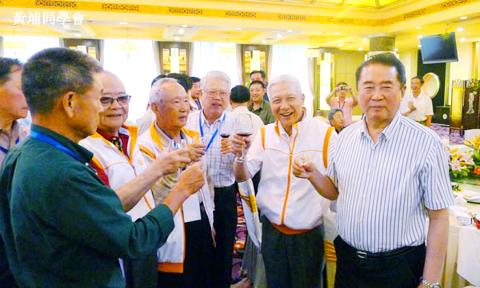|
General¡¦s alleged comment draws fire
¡¥ONE CHINESE ARMY¡¦: The KMT caucus said the
defense minister should resign for failing to set clear rules on cross-strait
military personnel exchanges with Beijing
By Shih Hsiu-chuan, Vincent Y. Chao and Rich Chang / Staff
Reporters, with CNA

A photo grab from the Web site of
Huang Pu Jun Xiao Tong Xue Hui shows former Republic of China Air Force General
Hsia Ying-chou, right, and other retired generals from Taiwan and China toast in
Sichuan Province.
Photo: Lo Tien-pin, Taipei Times
Lawmakers across party lines yesterday
lashed out at a retired general for allegedly suggesting that the Republic of
China (ROC) Army and the People¡¦s Liberation Army (PLA) be called ¡§China¡¦s
army.¡¨
Taiwanese media, citing a Chinese media report quoting PLA Major General Luo
Yuan (ù´©), said a Taiwanese speaker recently told a gathering of retired
generals from both sides of the Strait in China: ¡§From now on, we should no
longer separate the ROC Army and the PLA. We are all China¡¦s army.¡¨
The report identified the speaker as former ROC Air Force General Hsia Ying-chou
(®LÃs¬w).
The Ministry of National Defense (MND) yesterday issued a statement saying it
had checked with Hsia, who said the media report was ¡§not factual.¡¨
The statement said the ministry had never authorized any group or individual to
discuss, exchange views or speak with China on its behalf, adding that any
comments made by individuals were said in a ¡§private¡¨ capacity.
DENIAL
Hsia¡¦s denial did little to appease lawmakers, with the Chinese Nationalist
Party (KMT) caucus demanding the resignation of Minister of National Defense Kao
Hua-chu (°ªµØ¬W) and Political Warfare Department Acting Director General Wang
Ming-wo (¤ý©ú§Ú), saying they had ¡§failed to set clear rules on military personnel
exchanges with China.¡¨
KMT caucus whip Hsieh Kuo--liang (Á°ê¼Ù) said the reported comments had ¡§seriously
damaged the country¡¦s dignity.¡¨
Although retired generals are not banned from visiting China, the ministry must
ensure that their statements and actions in China ¡§meet public expectations,¡¨
Kao said.
KMT Legislator Wu Yu-sheng (§d¨|ª@) said Hsia should apologize to the public and
the Taiwanese military if the reports were true.
Wu added that statutory rules were needed to ban retired military officers from
engaging or attending military-related exchanges or forums in China.
Wang, however, expressed reservations about formally banning cross-strait
exchanges of military officers.
¡§The MND never authorizes any groups to attend these exchange activities,¡¨ Wang
said.
He added that under current rules, retired military officers are not barred from
making statements or attending cross-strait military exchange activities and are
not subject to punishment as long as they do not disclose classified
information.
Dissatisfied with Wang¡¦s answer, Hsieh said the ministry, including Kao, should
be held responsible if it failed to address the problem.
Democratic Progressive Party (DPP) lawmakers questioned whether Hsia should
continue receiving pension benefits as mandated by law, which amounts to about
NT$170,000 a month.
If the allegations were true, the government should consider whether it is right
that the retired general, ¡§a person who wants to be a part of the Chinese army,¡¨
deserves to continue receiving money from Taiwanese taxpayers, DPP Legislator
Wong Chin-chu (¯Îª÷¯]) said.
¡¥TRAITORS¡¦
DPP Legislator Tsai Huang--liang (½²·×·ã) said retired generals who had traveled to
China are ¡§traitors who wished they were communists.¡¨
The DPP caucus said the caucus was also considering amending the law to prevent
retired senior officers from imitating the behavior of those retired generals,
which they said had ¡§impacted on Taiwan¡¦s security.¡¨
Replying to media questions on the sidelines of an industrial forum in Taipei,
Premier Wu Den-yih (§d´°¸q) said he found Hsia¡¦s alleged remarks unacceptable,
adding that they ¡§were inconsistent with the fundamental policy of the Republic
of China.¡¨
|
![]()
![]()
![]()